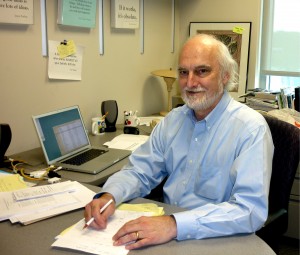 Dr. Tim Finin specializes in artificial intelligence and has been working on developing smart phones that can guage their user’s “context.”
Dr. Tim Finin specializes in artificial intelligence and has been working on developing smart phones that can guage their user’s “context.”
Dr. Tim Finin, professor, was inspired to study artificial intelligence to prove all those wrong who doubted the possibility of intelligent machines. “The working hypothesis that I accepted in college was that animals and people are machines,” says Dr. Finin, explaining that computers are simply a different type of machine. “What I have always found interesting since I was an Undergraduate was the idea that we could make machines as smart as people,” he explains, whose research involving semantic web technology is directed towards realizing that goal.
“The most important development in information technology in the last 25 or 50 years has been the world wide web,” says Dr. Finin. The internet provides people with immediate access to a vast network of information and services. “We’d like to do the same thing for computers as well,” explains Dr. Finin who is working on a long-term project to develop standards for producing data that computers can easily understand. Search engines, like Google, Bing and Yahoo, are especially interested in making this happen, he says.
Dr. Finin is also looking at the potential of smart phones to understand not only a user’s location, but their context (i.e. what you’re doing and why you’re doing it). The project, a collaborative effort with fellow CSEE professor, Dr. Josh, is being sponsored by the National Science Foundation (NSF). Dr. Finin explains that smart phones are equipped with sensors that are able to collect different kinds of data about a person’s behavior. A GPS, for example, reveals location, while an accelerometer can distinguish specifics like whether or not someone is walking, running, or riding in a car, explains Finin. Smart phones also have the ability to pick up on Bluetooth and wireless signals, which can be clues to a cell phone user’s location as well.
 Dr. Finin is working on two projects concerning context. In the first, students were asked to carry around smart phones that recorded their behavior every fifteen minutes. Using this data, Dr. Finin and his research collaborators were able to make the phone predict behavior with 80-90 percent accuracy for ten different activities. Smart phones with the ability to predict behavior may potentially be helpful for things like automatically turning a ringer off when you’re in class or work, or sharing your whereabouts with friends.
Dr. Finin is working on two projects concerning context. In the first, students were asked to carry around smart phones that recorded their behavior every fifteen minutes. Using this data, Dr. Finin and his research collaborators were able to make the phone predict behavior with 80-90 percent accuracy for ten different activities. Smart phones with the ability to predict behavior may potentially be helpful for things like automatically turning a ringer off when you’re in class or work, or sharing your whereabouts with friends.
The second project related to context deals with implementing a privacy policy that restricts the amount of personal information others are privy to. “We’ve developed a vocabulary for describing activities that allow you to express things at different levels of accuracy,” explains Dr. Finin. For example, you may want to share all the details about what you’re doing and who you’re doing it with, with family members, but be less specific with friends or acquaintances. The goal is to allow smart phone users to specify how much information they release to others.
Dr. Finin’s work with smart phones reveals their great potential for functioning intelligently. “In the course of my professional career, I have seen a lot of amazing things come to fruition in the area of intelligent systems,” says Dr. Finin, giving as examples chess-playing computers, machine translation, speech recognition, and self-driving cars—which Dr. Finin believes will become commonplace within the next 20 years. But, despite such technological advances, and his progress with smart phones, Dr. Finin is motivated by his belief that his dream of developing truly intelligent machines has a long way to go. “My ultimate goal is to help figure out how to create truly intelligent machines and it’s a goal I will never achieve in my lifetime.”